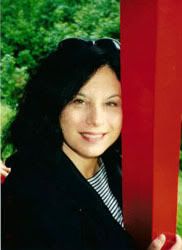|
MAXINE CHERNOFF |
Notes to Self
“Despite
his moments of thralldom in. . . deepest
give up the vocabulary of
children’s art.” –Roger Shattuck
1.
He knew the names of flowers,
the gem-like words for
things--
unlike most of nature,
which, as it instructs,
ceases to entertain
2.
Wegg’s leg became a doll
before cyber-punks were born
When they mapped the human genome
they found me lacking. This can
also be said of the real vs.
virtual realm
3.
A song of imperfection so lovely
as to defeat decadent
aestheticism.
I saw it on TV.
Karaoke.
People moving their lips, a girl
whispering inside a shadow-box.
4.
He pushed his stomach
out of his mouth to eat:
must be
a starfish, our tour
guide said.
Kristeva writes, “I expel
myself.
I spit myself out.”
5.
AM I GETTING IT RIGHT?
was scrawled on the
bathroom wall.
Suggesting landscape and cloudscape,
as a sick man who imagines
the illness outside of
himself.
6.
Anonymity was growing cold
when death technologies were
invented.
She spoke of taking pains to
be a good host. But what do cyborgs
eat?
she asked the Panel on Non-food
Cuisine.
7.
“Don’t worry. We won’t let you die,”
culture said to anarchy.
Too few skeletons in the closet
to make things interesting.
“Born
in
8.
She thought she’d seen a ghost.
But disembodiment is a technological
fantasy, meant to signify
transcendence
of materiality. No syntax
for the concept of memory vs.
Memorex.
9.
He said of the abdominal cavity:
“Such a primitive place. One expects
to find paintings of
buffalo on the wall.”
Inside the gallery was another gallery.
Inside that a sanctuary.
10.
I’ve never met a utopia I didn’t like.
Simulated war and
simulated pain.
“This is
not a pipe” written in mind or eye.
Simulated love on the Simulator Channel.
A home inside the
neutral gleam.
|
|
|
